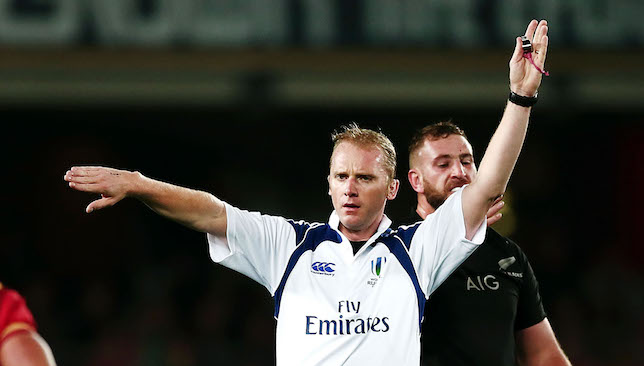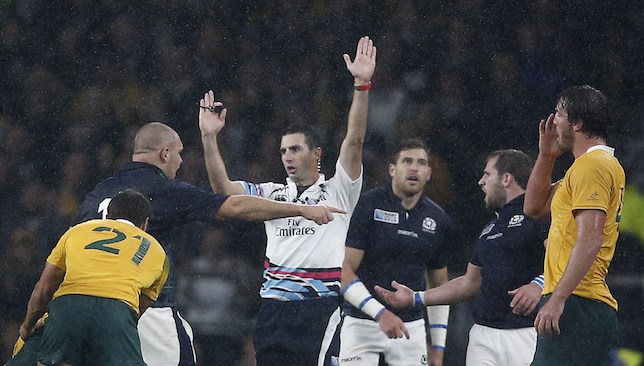
Wayne Barnes is one of the most respected referees in rugby. Since emerging onto the world circuit in 2006 as the youngest ever international referee at the age of 27, the Englishman has gone on to whistle over 60 international matches – placing him fourth on the list of most Tests officiated.
In what has been a distinguished career to date, the 37-year-old also holds the record as most-capped Rugby World Cup referee of all time, having taken charge of 15 games over three tournaments in 2007, 2011 and 2015.
Sport360 caught up with him at the Dubai Rugby Sevens’ Long Lunch.
I got injured playing rugby at the age of 15 and a chain of events led me into refereeing. A teacher of mine was a referee and a friend of my dad’s was also refereeing at the time. I did a few school games and then my dad’s friend said ‘if you’re refereeing school games then come and do a few of the local third team games and I’ll do the first team games’. It was all rosy to start off with as a 16-year-old.
I used to love refereeing the Dubai Sevens. I was out here when it used to be the Exiles in 2002 and 2003. They are cracking memories and I’ve made some great friends from being involved in events like that. Nigel Owens and Craig Joubert were also out here with me back then, two men who remain great friends today.
Refereeing three World Cups was very special. I live in Twickenham so to be able to referee, in effectively your own back garden, at last year’s World Cup was incredible. I refereed the quarter-finals and semifinals, and to be able to put a bag on my back and walk to the stadium was special for me.
We work hard as a group. We all try and improve. I think there is a perception that referees turn up an hour before the game on a Saturday, and then don’t think about the game until the following weekend. I’ve been refereeing for 11 years. There are eight of us who are full-time in England now and we train hard all week. We then prepare thoroughly and review thoroughly.
We get in experts: scrum coaches, breakdown coaches, sports psychologists and nutritionists, to help us. We’re just like the players. We want to get better and we surround ourselves with the best people so we can improve all the time.
We all help each other out. Nigel [Owens] and I refereed in 2007. We get on very well and he even sang at my wedding (Owens sang the hymn ‘How Great Thou Art’ solo, and described the moment as the most nerve-wracking of his life).
Craig [Joubert] and I came through the ranks together, through the Sevens Series so we’ve shared a lot as friends. You admire your peers. Whatever trade you do, you always look at people you aspire to be.

Good friend: Craig Joubert.
Tony Spreadbury, Ed Morrison and Chris White are three other referees who stood out as inspirations for me.
On Monday we have a strength and conditioning coach who trains us in the morning at Twickenham. Then we’ll do our reviews from the weekend, followed by a recovery session in the afternoon. We all stay on Monday night at Twickenham.
On Tuesday morning, we do a running or bike session at 8am, followed by a second session before lunch. We sometimes get Wednesday off.
Depending on where we are travelling at the weekend, decides what kind of training we do on a Thursday. It’s very much loaded at the start of the week.
We’re all different personalities too. That’s what’s special about the game. The characters of the game are the ones that people remember. They are the ones that people switch on to see and to listen to.
How do you deal with your boss or how do you deal with your line manager? That’s the fun of growing up and learning your trade, and knowing what ticks people’s boxes.
A good game is when I finish a match and nobody is talking about me, and everyone is talking about the game and the players. Some games, and we’ve all had them, the spotlight comes on you, because you had to make a difficult or near-impossible decision. You hope it doesn’t happen, and that the players decide the game.
It’s happened in every World Cup and I’ve been one of those who has unfortunately had to make a difficult decision like that. In live time, it’s very difficult.
Player welfare has always been one of the key elements. World Rugby and the RFU are doing really well. Doctor Simon Kemp is one of the leaders of it, and he’s doing a fantastic job.
During a game, if we see someone who looks like he has taken a blow to the head, then it’s our role to make sure they are correctly diagnosed straight away. In the Premiership, a doctor from each side is watching the match from the sideline with an iPad, to make sure that if the on-field officials and medics don’t get it, then they can review the incident straight away.
We are taking it very seriously as a sport and rightly so because of player safety.
I’m a criminal barrister, specialising in Bribery and Corruption for Fulcrum Chambers in London. We look after companies who are being investigated for fraud, bribery and corruption allegations.
A referee and a lawyer, perhaps two of the most hated jobs in the world! But it’s a nice way to have a release.
What’s important about professional sport is you’ve got something to take your mind off things.